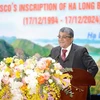Musicians from Hanoi, Hue, Ho Chi Minh City and Tokyo will participate in the third annual Zither Festival in HCM City this week.
Several exhibitions and talks by music professors, including musicologist Tran Van Khe, will be held.
Khe spent years researching the zither, a traditional multi-stringed instrument popular in Asia .
In Vietnam , it is called “dan tranh” or “dan thap luc” (16-chord zither).
The zither is known as “koto” in Japan , “kayagum” and “komungo” in Korea and “guzheng” in Singapore .
“Kayagum” and “komungo” are played with the fingertips while other zithers are played with plectrums.
Singapore 's “guzheng” is similar to Vietnam 's “dan tranh” but it is larger and boasts between 18 and 21 cords.
The deep sounds of the “kayagum” are similar to that produced by Vietnam 's “dan day” (with a long neck and three strings, a distant cousin of the guitar).
Well-known artist Nguyen Thi Hai Phuong, who has won top awards at local and international music competitions, will perform at the festival.
One of Asia's leading zitherists, Phuong has featured in solo and group performances in many countries, and now works as a music teacher at HCM City 's Academy of Music .
Zitherists Hong Nga and Hong Hanh from the Hue Academy of Music and Vietnam Institue of Musicology, will also perform.
Japanese artists Toshiko Nagase and Kenzan Nagase will present their traditional music on the koto.
Organised by the HCM City Sound of the Homeland Club and its partners, the festival aims to preserve and popularise traditional music.
"We're interested in performing and teaching traditional music because we believe the art can connect people around the world," said Phuong, a lecturer and member of the Sound of the Homeland Club, which was founded 32 years ago.
The club has hosted several traditional music exchange programmes between the club and music troupes in Canada , Japan , the Republic of Korea and France .
The four-day festival will begin at 7.30pm on Sept. 21 at the Lao Dong (Workers) Culture Palace , 55B Nguyen Thi Minh Khai Street , District 1. Tickets, which are free, are available at the Culture Palace.-VNA
Several exhibitions and talks by music professors, including musicologist Tran Van Khe, will be held.
Khe spent years researching the zither, a traditional multi-stringed instrument popular in Asia .
In Vietnam , it is called “dan tranh” or “dan thap luc” (16-chord zither).
The zither is known as “koto” in Japan , “kayagum” and “komungo” in Korea and “guzheng” in Singapore .
“Kayagum” and “komungo” are played with the fingertips while other zithers are played with plectrums.
Singapore 's “guzheng” is similar to Vietnam 's “dan tranh” but it is larger and boasts between 18 and 21 cords.
The deep sounds of the “kayagum” are similar to that produced by Vietnam 's “dan day” (with a long neck and three strings, a distant cousin of the guitar).
Well-known artist Nguyen Thi Hai Phuong, who has won top awards at local and international music competitions, will perform at the festival.
One of Asia's leading zitherists, Phuong has featured in solo and group performances in many countries, and now works as a music teacher at HCM City 's Academy of Music .
Zitherists Hong Nga and Hong Hanh from the Hue Academy of Music and Vietnam Institue of Musicology, will also perform.
Japanese artists Toshiko Nagase and Kenzan Nagase will present their traditional music on the koto.
Organised by the HCM City Sound of the Homeland Club and its partners, the festival aims to preserve and popularise traditional music.
"We're interested in performing and teaching traditional music because we believe the art can connect people around the world," said Phuong, a lecturer and member of the Sound of the Homeland Club, which was founded 32 years ago.
The club has hosted several traditional music exchange programmes between the club and music troupes in Canada , Japan , the Republic of Korea and France .
The four-day festival will begin at 7.30pm on Sept. 21 at the Lao Dong (Workers) Culture Palace , 55B Nguyen Thi Minh Khai Street , District 1. Tickets, which are free, are available at the Culture Palace.-VNA



















